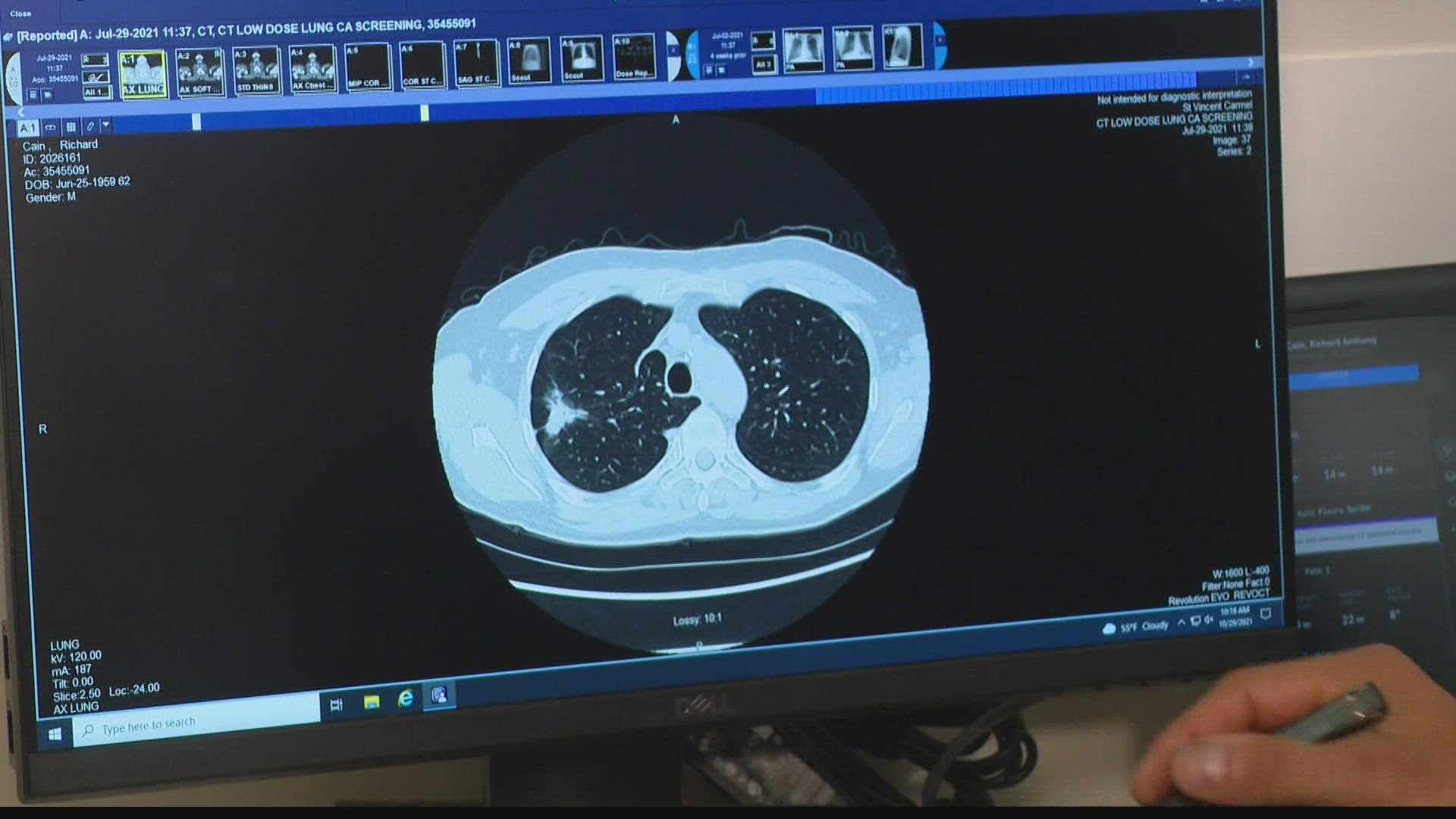INDIANAPOLIS — When working from home ended, Dick Cain noticed a change in his health that may have saved his life. His job transitioned back to the office in downtown Indianapolis this summer and Cain was surprised to discover he got short of breath walking the few blocks from his parking spot to his desk.
At first, he attributed it to the heat. Perhaps he was dehydrated?
"There's about a five-block walk from my car to the office, so I was coming out of the office one day...I got about a block and a half...and I'm having trouble breathing. I thought, 'you're out of exercise, you're 62 years old.' Whatever, didn't think a whole lot of it," Cain recalled. "Then three or four weeks later, sitting on the couch, trying to catch my breath, something inside resonated that something's wrong."
So he made an appointment with his primary care physician. He's a long-time smoker and knew he was at risk of lung cancer.
Cain said he started smoking when he was 12 or 14 and never stopped. Given his smoking history and symptoms, his doctor ordered an x-ray of Cain's chest. It looked clear. The doctor pressed on and ordered a low-dose CT scan. The images revealed three spots in Cain's lungs and he was referred to a specialist.
Dr. Vru Patel, a pulmonologist at Ascension St. Vincent, called the CT findings worrisome.
"It's not normal shape, it's a little irregular border," Patel said. "So when I first saw that, my first thought is this could potentially be lung cancer."
The news hit hard. Cain and his wife Cheryl have two daughters, Dakota, 21, and Sierra, 18, adopted from China and "loved to bits."
"When Daddy's sick, it is a big deal," Cain said.
He agreed to biopsies of the three nodules, which confirmed cancer.
"I'm still digesting the fact that I have lung cancer. I have it. There's no question about it," Cain said. "The weird thing is, is I had no other symptoms, coughing, no wheezing, no coughing up blood, nothing."
But he did have that shortness of breath and a major risk factor because he was a long-time heavy smoker.
"Nicotine addiction is a terrible thing," Cain said. "Once you get addicted to it, it's tough to break it, and I'm still working on breaking it."
Cain had surgery earlier this month. Doctors removed less than half of his right lung and are optimistic.
"I believe the fact that we caught it very early, and it doesn't show any spread anywhere else, his prognosis is great," Patel said.
Patel termed Cain's cancer stage one and after surgery, he's considered cured.
"It's the only way to offer a cure for lung cancer, all the other options, you don't want. The radiation, chemotherapy, and all those other things, that's not really a cure. The only cure is to actually surgically remove it early on," Patel said.
Patel said the best way to find lung cancer is to proactively screen patients like Cain who are considered at-risk.
"Don't blow it off, because it's not going to go away," Cain said. "You can ignore it, but it's not going to go. That's one thing I have learned in my life. You can ignore unpleasant things, but they don't go away."
Patel says nationally less than 6 percent of people who qualify for this screening actually get it.
Criteria to qualify for screening
- 50-80 years old
- Current smoker or quit smoking within the past 15 years
- Heavy smoker or used to be a heavy smoker (pack a day for 20+ years)
If you are deemed at-risk, the screening would be covered by insurance. Without insurance the Low Dose CT Scan costs $99 at Ascension St. Vincent through Check-Up 13.
LINK: Learn more here.

